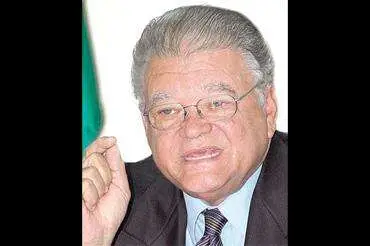
Carib Cement takes on Samuda
Caribbean Cement Company (Carib Cement) has accused Commerce Minister Karl Samuda of misrepresenting the company’s position with regards to the importation of cement.
Last week, Samuda said in a press conference that Carib Cement signed off on an agreement allowing the private sector to import, free of the Common External Tariff (CET), the equivalent of 15 per cent (120,000 tonnes) of the local cement market.
But at its own press conference held yesterday, Carib Cement said it took issue with Samuda’s comments because of what it charged is an inference by the minister that the cement company had agreed to the importation of 15 per cent cement on a perpetual basis. According to Carib Cement, the agreement only covered a specific amount of 120,000 tonnes for 12 months, the same time-period allowed in similar agreements prior.
Carib Cement chairman Brian Young gave his account of how the deal with the Government was brokered. He said prior to the September 2009 expiration of the previous 12 month CET waiver on imported cement, Carib Cement advised Samuda that the company was able to fully supply the market and was no longer agreeable to any waiver of the CET. However, Young said, the minister noted that he was not comfortable with the company’s ability to supply the market and advised that he wished for 170,000 tonnes per annum of cement to be imported free of CET for the next year and a percentage to be imported on a perpetual basis. Young said Carib Cement didn’t agree with Samuda’s proposal, but instead made a “compromise” for the waiver of the CET on 120,000 tonnes of imported cement for the next 12 months. And to support this argument, Young provided journalists with a letter he wrote last September to permanent secretary in the commerce ministry Reginald Budhan, advising him of the company’s position.
“It follows therefore that the minister was not correct in inferring Carib Cement Company Limited agreed to a waiver (of the CET on imported cement) for more than one year, or an amount based on a percentage split of 15/85 per cent,” said Young at the press conference, held at the Jamaica Pegasus hotel in Kingston.
Samuda did not immediately respond to email and phone messages from Caribbean Business Report seeking a response to Young’s comments.
Carib Cement, Jamaica’s sole cement producer, held a monopoly until 2006 when Government granted a waiver on importations after the company sold defective products to the market. The then PNP adminstration, in the wake of the fiasco, first granted the waiver to make up the resulting shortfall in the market until upgrades and expansion at the cement manufacturer’s Rockfort plant were complete.
Carib Cement has said that its expansion is now at an advanced stage and the company can satisfy the demand of the local market. But Samuda last week said the company has still not demonstrated that they are prepared to provide the levels of inventory that would give Jamaica protection against the possibility of a cement shortage.
Carib Cement general manager Anthony Haynes said exports of cement for 2010 thus far have outpaced that of imports under the existing duty waiver regime, which he said is evidence of the company’s ability to supply the local market.
“In the context of a domestic market that is shrinking to 2001 levels and our demonstrated ability to supply this market we continued to be perplexed by a policy that provides a very narrow interest group with an unfair advantage,” he said.
Government recently granted a waiver to hardware suppliers Tank-Weld for the importation of 60,000 tonnes of cement, a move which Samuda contends will provide competition in the market.
The commerce minister has repeatedly defended his position that 15 per cent of the local cement demand would be allowed duty free to provide options for local consumers.

























